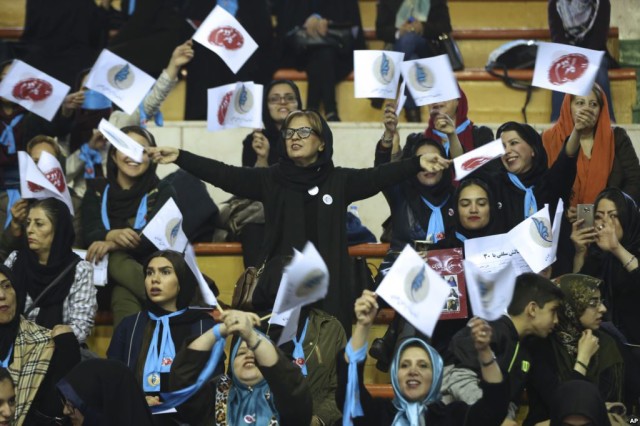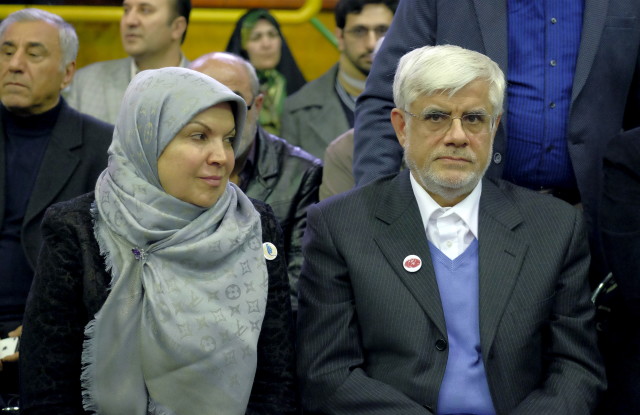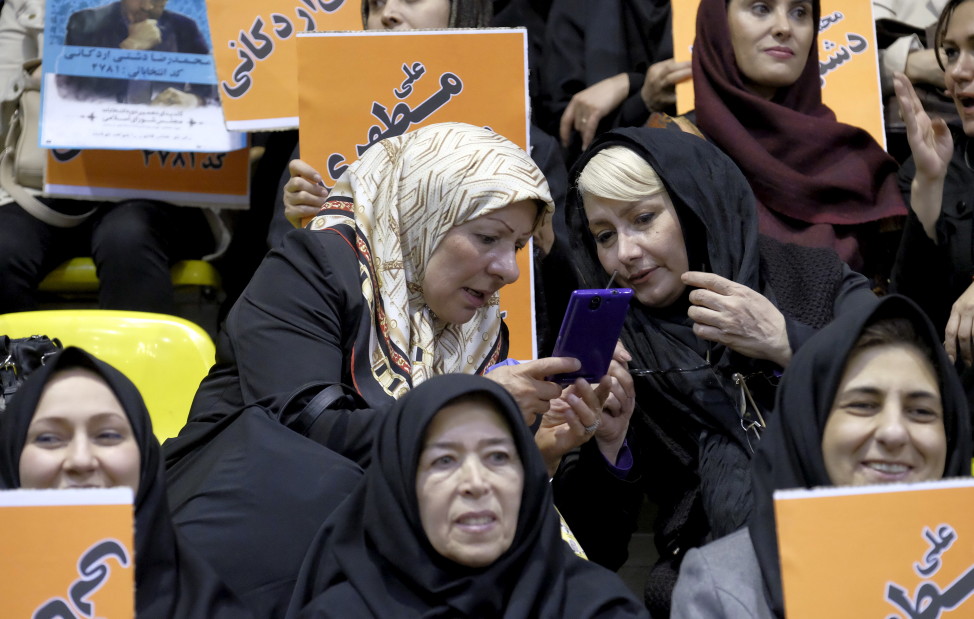By Barbara Slavin
Election Day in Iran is this Friday and the country’s leaders are urging Iranians to vote in large numbers, even though the candidates exclude key members of the embattled reform movement and the governing bodies being chosen have limited power within Iran’s hybrid political system.

Iranian women wave flags of reformists for the parliamentary elections in a campaign rally in Tehran, Iran, Feb. 18, 2016.
Voters are to select a new 290-member parliament and an 88-man Assembly of Experts, a clerical body that will be tasked with approving a successor to the real leader of Iran – Supreme Leader Ayatollah Ali Khamenei – if the 76-year-old dies within the next eight years.
When given the opportunity, Iranians have generally voted for the least doctrinaire candidate on offer as a way of showing displeasure with the authoritarian nature of their regime. This time, most reformists were eliminated from contention by yet another body, the Guardian Council, whose dozen members are largely appointed by Khamenei and who vet all candidates for elected office. So, reform-minded voters are being asked to settle for candidates who are considered moderate or even somewhat conservative by Iranian standards, but who have vowed to support the pragmatic president, Hassan Rouhani.
A similar strategy led to Rouhani’s 2013 election over harder-line alternatives and could result in defeating a number of reactionary incumbents in parliament and for the Assembly of Experts. While Khamenei has the final say on all key decisions in Iran, a more pro-Rouhani parliament would give the president an easier time enacting economic and incremental political reforms.
Mohammad Reza Aref, a former vice president under reformist President Mohammad Khatami, worked with Rouhani to put together a list for parliament culled from those who passed the vetting process. The Guardian Council disqualified nearly half those seeking to run – including almost all reformists — but there are still 6,200 candidates for parliament nationwide, including 1,121 competing for 30 seats in Tehran.
The list headed by Aref, the “Alliance of Reformists and Government Supporters,” backs Iran’s recent nuclear deal with the international community and other efforts to reduce the country’s international isolation and improve its poor economic performance.

Iranian former vice-president Mohammad Reza Aref and his wife Hamideh Moravvej Farshi attend a reformist campaign for upcoming parliamentary election, in Tehran February 18, 2016. REUTERS
Aref, one of the few well-known reformers still allowed to participate in Iranian elections, is himself a symbol of pragmatic compromise. It was his decision in 2013 to drop out of the presidential race that set the stage for Rouhani’s win.
An engineer with graduate degrees from Stanford University, Aref has managed to avoid the fate of Khatami, who is considered the real leader of Iranian reformers but is prohibited from speaking in public. Khatami is constrained because of his support for two former presidential candidates, Mehdi Karroubi and Mir Hossein Mousavi. They have been under house arrest for five years for protesting apparent fraud in 2009 presidential elections.
Then-incumbent President Mahmoud Ahmadinejad was declared the victor despite widespread evidence that his government tampered with the results. Iranian security services brutally suppressed massive popular demonstrations in the aftermath of the election; hundreds of members of the so-called Green Movement that backed Karroubi and Mousavi were arrested or fled Iran. The current parliament, elected in 2012, contains a number of Ahmadinejad loyalists that Aref and company would like to see defeated.
There are no guarantees that officials won’t alter results for this week’s elections, but a large turnout would make that more difficult.
As he did in 2013, Aref is campaigning alongside his wife, a dermatologist, in a sign of their relatively liberal social views. His wife wears designer headscarves instead of the black, tent-like veils favored by more conservative Iranian women – another signal to an increasingly secular society.
The allotted period for campaigning for parliament in Iran is only one week but Iranians usually make the most of any opportunity for open political expression. Many of those attending reformist rallies in recent days have brandished pictures of Mousavi and Karroubi and called for their release. They have also held up posters of Khatami’s hands; it is forbidden to show his face in public.
Privately, Iranians are using cell phone applications such as Telegram to discuss the candidates and debate whether it is worth going out to vote. One Iranian who spoke on condition of anonymity said that a video of Khatami urging Iranians to participate in the elections is being circulated on Telegram.

Women check the news on a mobile phone during a campaign gathering of candidates for the upcoming parliamentary elections mainly close to the reformist camp, in Tehran Feb. 23, 2016. REUTERS
A large turnout would favor moderates – assuming the votes are accurately counted — in the same way that big showings tend to help Democrats in U.S. elections.
Farideh Farhi, an expert on Iran at the University of Hawaii, said “almost everyone I talk to [in Tehran] says he or she will vote” whereas none had voted in 2012. “As of now the forecast is that the percentage of voters will be more than the last election which was officially [but probably not really] 64 percent,” she said.
The parliamentary and Assembly of Experts elections are being held together this year in an effort to boost participation, particularly for choosing the Assembly, which meets rarely and whose current members are so old that Tehranis joke their average age is deceased. Of 800 people who sought to run for the Assembly, the Guardian Council disqualified all but 161. None of 16 women aspirants survived the vetting.
The reformists’ goal is to defeat three arch-conservative incumbents known collectively as J.Y.M. They are Ahmad Jannati, an octogenarian who chairs the Guardian Council, Mohammad Yazdi, another elderly cleric who currently heads the Assembly of Experts, and Mohammad Taqi Mesbah-Yazdi, who is known as “Ayatollah Crocodile” for his anti-democratic views.
President Rouhani is also running for the Assembly of Experts. So is a former president, Ali Akbar Hashemi Rafsanjani, a pragmatist who previously headed the assembly and may hope to do so again. Rafsanjani has proposed scrapping a single supreme leader after Khamenei dies and replacing him with a council as a way to dilute the office’s authority over directly elected institutions.
Cynics, of whom there are many in Iran after 37 years of authoritarian rule and years of punishing economic sanctions, may regard the whole electoral process as window-dressing and stay home. Rouhani, however, has urged them to take part, and used the analogy of going into a store to buy something you need, not finding the brand you want and settling for the closest alternative.
The strategy brings to mind an old song by the American rock group Crosby, Stills and Nash who suggest “If you can’t be with the one you love… love the one you’re with.”
Barbara Slavin is Acting Director of the Future of Iran Initiative at the Atlantic Council in Washington.

